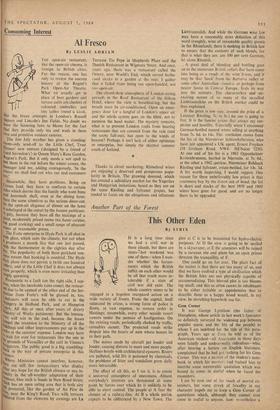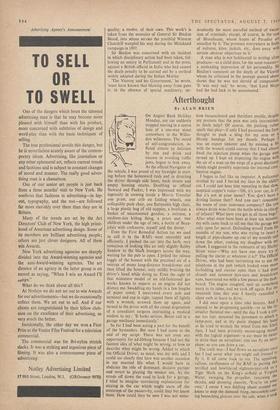Another Part of the Forest
This Other Eden
By STRIX The noises made by aircraft get louder and louder, causing distress to more and more people. Skylines bristle with architectural eyesores. Rivers are polluted, wild life is poisoned by chemicals, the problems of litter and vandalism grow daily more intractable.
The effect of all this, as I see it, is to create a universal atmosphere of uneasiness. Almost everybody's interests are threatened at some point by forces over which he is unlikely to be able to exert control. The people at A fear the closure of a railway-line. At B a whole parish expects to be obliterated by a New Town. The glen at C is to be inundated for hydro-electric purposes. At D the view is going to be spoiled by a skyscraper, at E the amenities will be ruined by a caravan site and plans for an open prison threaten the tranquillity of F.
One could go on for ever. The plain fact of the matter is that there are too many of us, and that we have evolved a type of civilisation which the British Isles are not physically capable of accommodating. This blessed plot is too bloom- ing small; and this so often causes its inhabitants to be either irritable or apprehensive that to describe them as a happy breed would, in my view, be stretching hyperbole too far.
Gem Corner
It was George Lyttelton (the father of Humphrey, whose article in last week's Spectator so definitely surveyed the widening gap between popular music and the life of the people) to whom I am indebted for the title of this para- graph. Years ago at Eton he told us of the American student—all Americans in those days were faintly and undeservedly ridiculous—who, after hearing a lecture on English literature, complained that he had got nothing for his Gem Corner. This was a section of the student's note- book in which his mentors had trained him to inscribe some memorable quotation which was bound to come in useful when he faced the examiners.
I am by now out of she reach of mortal ex- aminers, but some streak of frivolity in my character impels me to keep a Gem Corner of quotations which, although they cannot ever come in useful to anyone, have nevertheless a
quality, a timbre, of their own. This week's is taken from the memoirs of General Sir Bindon Blood, into whose service the youthful Winston Churchill wangled his way during the Malakand campaign in 1897.
Sir Bindon was concerned with an incident in which disciplinary action had been taken, fol- lowing an outcry in Parliament and in the press, against a British official in India who had caused the death penalty to be carried out by a method widely adopted during the Indian Mutiny.
The Viceroy and his Government,' be wrote, 'must have known that blowing away from guns is, in the absence of special machinery, un-
doubtedly the most merciful method of execu- tion of criminals; except, of course, in the case of Musulmans, whose hopes of Paradise are annulled by it. The presence everywhere in India of vultures, kites, jackals, etc., does away with certain obvious objections to it.'
A man who is not habituated to writing often produces—as a child does, for the same reasons—. a misleading impression of his personality. Sir Bindon's comment on the death of the Viceroy whom he criticised in the passage quoted above shows that he was not devoid of compassion. 'It was very sad,' he wrote, 'that Lord Mayo had the bad luck to be assassinated.'































 Previous page
Previous page